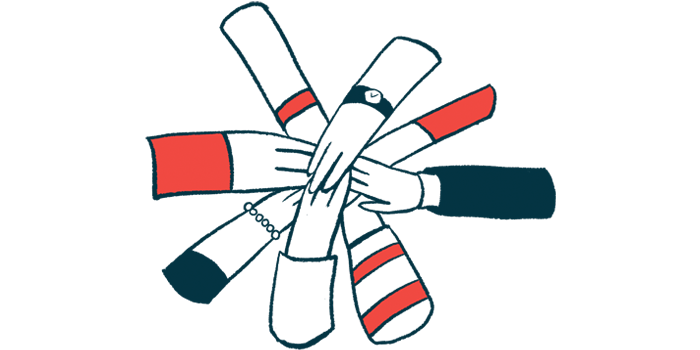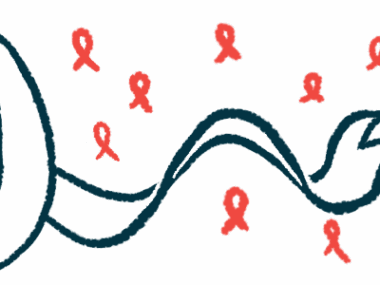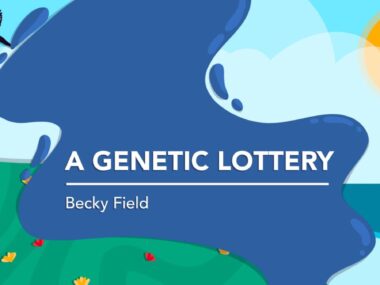This awareness month, spotlight is on the patient experience
Patients, caregivers tell stories on social media as part of worldwide campaign
Written by |

May is Huntington’s Disease Awareness Month, and this year the focus is on the patient experience.
Huntington’s disease (HD) is a neurodegenerative disorder thought to affect 4.9 per 100,000 people worldwide, including about 41,000 U.S. residents, and can impact many aspects of everyday life.
While each patient’s journey is different, the progressive disease is characterized by symptoms including involuntary jerking known as chorea, walking problems, and issues with speech and swallowing.
People with HD may experience cognitive impairment and have difficulties in planning, thinking, and organizing. Other common symptoms include emotional instability and behavioral changes.
The disease typically manifests when people are in their 30s and 40s, though in some 5%-10% of cases, symptoms start before age 20. These patients are diagnosed with juvenile Huntington’s.
Awareness is key to diagnosis, care
Disease awareness is key to advancing HD recognition and improving diagnosis and care.
Throughout May, Huntington’s Disease News is running a series called “Huntington’s Disease Community Spotlight.” Every three or four days, the series will feature a patient or caregiver impacted by HD who has been invited to tell their story, said Brad Dell, director of community content at Bionews Inc., which publishes this website. The stories will appear on Instagram and Facebook.
Becky Field, a Huntington’s Disease News columnist, is the initiative’s moderator. Her father, grandfather, and great-grandmother died from HD complications, and her brother was diagnosed at 41. Field tested negative for the disorder last year.
“I am so full of admiration for the people in the HD community and for the writers included in this initiative, who have given their time and who have entrusted me with their stories,” Field said. “I continue to be inspired by their courage, determination, but most of all their love for their families and the HD community. I know this community spotlight will help to raise awareness, which is so important.”
International Huntington’s Disease Awareness Day is May 15.
Throughout the month, Huntington’s Disease Society of America (HDSA) chapters nationwide will present educational programs, fundraising activities, and community events to foster a greater understanding of HD while supporting those the disease impacts, according to a press release received from the HDSA.
A key campaign component is #LetsTalkAboutHD, an initiative that encourages families around the world to share their experiences on social media through photos, videos, or written narrative to “personalize the profound effects” of Huntington’s, Louise Vetter, HDSA’s president and CEO for the last 15 years, told Huntington’s Disease News.
“It helps families own their stories, share their experiences, and explain what it means to live with the illness,” Vetter said. “It takes us past the medical jargon into the real impact of HD and its burden generationally. What it means to live with fear, develop the symptoms, and the loss and grief of caregiving. … It really helps to put color to the words on the page.”
Awareness month will culminate in the organization’s 39th Annual HDSA Convention to be held in Spokane, Washington, May 30-June 1. The event brings together HD families, advocates, and researchers for a weekend of learning and connection. The meeting will feature updates on the latest research, an HDSA Team Hope Walk, and educational workshops, ending with a gala and awards presentation.
“HD families are the strongest, most resilient group of people I’ve ever met in my life, ” Vetter said. “They show such strength and grace that it’s hard not to be inspired. The clinicians who care for HD patients are the most giving group of doctors … it’s unparalleled, really. And the scientific community is small but very united. It gives me a lot of hope.”
Events in Canada, Europe aimed at raising awareness
Elsewhere, the Huntington Society of Canada (HSC) is inviting Canadians to participate in its annual Huntington Heroes National Walk, which seeks to raise $175,000 to support Canada’s HD community. Contributions made before June 30 will be matched dollar for dollar by an anonymous donor, according to the walk webpage.
In-person walks — participants may walk, run, or use a wheelchair — kick off on May 11 and go through May 26. From Lockport, Manitoba, to Sarnia, Ontario, 17 events will be held throughout Canada, with distances ranging from 5 km (3.1 miles) to a half marathon (13.1 miles).
Various HSC chapters will present virtual walks on May 25-26, in which participants may log kilometers in their neighborhood at their convenience. The cumulative goal for all participants — virtual and in-person — is 4,000 km (2,485 miles).
All involved in the national walk are asked to share photos on Facebook and Instagram, using the hashtag #HuntingtonHeroes.
“The Huntington Heroes theme celebrates the everyday heroes that make up the HD community — caregivers, professionals, and those at-risk or living with the disease who are compassionate, courageous and committed to support,” the organization notes on the webpage.
The society is joining other Huntington’s organizations internationally in the #LightItUp4HD campaign, in which structures and landmarks in Canada and around the world are lit up in blue for HD and purple for juvenile HD.
Individuals are also encouraged to light their residences or offices in blue or purple and place a campaign sign in a window.
Huntington’s has for many years “been kept secret in families, due to stigma and discrimination,” the HSC states on the initiative’s webpage. “The LightItUp4HD campaign is a wonderful opportunity for those with HD to raise awareness, make connections, receive support from their communities, and move forward with pride and dignity,” the association said.
In Ireland, Trinity College Dublin is marking Huntington’s Disease Research Day on May 21 with an HD community event. The presentation will feature Huntington’s scientists who will discuss their work and the latest global developments in HD research.
And the European Huntington Association (EHA) is observing the month with a campaign called #HuntingtonDance.
“Back in the Middle Ages, Huntington’s disease was named St. Vitus dance in many European countries,” Astri Arnesen, EHA’s president, explains in a video about the initiative. The saint, Arnesen said, “was called upon to help cure patients because according to the legend, he had once cured a child with it.”
“And later on, chorea was used to describe the disease,” Arnesen said. “This is a Greek word meaning dance as well. So for ages, dance has been used as an expression to describe Huntington’s disease. And we thought this was an excellent opportunity to use the description and the concept in a completely new context.”




